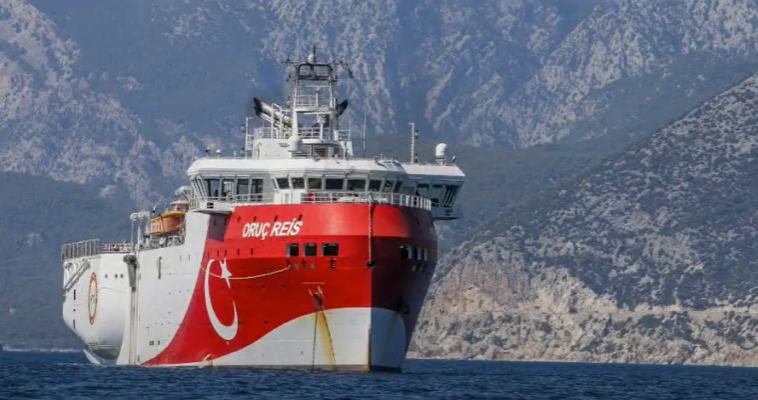Themis Tzimas: It is not just an invitation to negotiations, it’s also an ultimatum
30/07/2020
An official Turkish announcement came, after the information leaked, both by the Spanish Foreign Minister and a series of publications, mainly of the Turkish and foreign press: The Oruc Reis research vessel is currently staying in the port of Antalya and will remain there for about a month in order for supervised Turkey-Greece negotiations to start in the meantime.
Negotiations in principle are a positive development. However, there are many big “ifs”. And as is well known, what precedes the “if” often ceases to have effect. Even if the time might slightly vary, it turns out that we are not basically talking about a German-Turkish invitation to negotiations, but a Turkish ultimatum, cloaked in international (certainly German) legitimacy.
It is not only the existence of a time frame, combined with the temporary freeze, but not with the undoing of the Turkish offensive moves. And it’s not just that the time frame is extremely tight. It is so tight that the Greek Armed Forces are being tested, without however being able to take many actions, but at the same time it is sufficient for Turkey to further its own plan.
In addition to the above, it is also the case that the subject of the negotiation was raised – both in substance and in terms of style – by Turkey in a way that could not be challenged. The discussion, as the Vice President of Turkey explained, will concern everything that has to do with Turkey, the acceptance by the Greek side of the Turkish-Libyan memorandum, the “Blue Homeland”, the demilitarization of Greek islands and (not accidentally) with the so-called Greek genocidal policy! All this, without even discussing the Cyprus issue.
An agenda with different speeds
It is an agenda of different speeds: discussing the EEZ is the first step and probably the easiest. If only this were the case, Greek-Turkish relations could be resolved preferably through mutual recourse to international justice. The biggest problem, however, lies in the overall, revisionist Turkish agenda.
The course of Turkey over time proves that this agenda has not been set to create impressions, but in order to be gradually implemented. The issue of demilitarization is raised in order for a key part of Greek territory to remain completely undefended, as the treacherous junta did with Cyprus, paving the way for the 1974 invasion of Cyprus.
The issue of the so-called Greek genocide against the Muslim population is an attempt to historically justify future efforts to raise issues in Western Thrace. Finally, the “Blue Homeland” is the framework for turning Greece into a satellite state, through the emergence of Turkey as the major naval state of the Eastern Mediterranean.
Greece should not be complacent
Whether these issues will be tabled together immediately, in order to undermine this negotiation from the beginning or not, remains to be seen. The statements of the Vice President of Turkey, however, have already paved the way and highlighted what the Greek government will be called upon to negotiate. Even if there was some doubt as to Turkey’s intentions, the Turkish version of issuing NAVTEX in Cyprus clarifies Turkey’s intentions.
It seeks and expects to split the Cyprus-Greece front, which due to the abandonment of the unified defense doctrine has long since fallen apart. It is seeking the isolation of Cyprus and sends a clear message to Greece that Turkey perceives its own faits accomplis as given and beyond question. It mainly sends a message to Greek Cypriots that Greece has abandoned them.
Based on the above, it can be concluded that Turkey seeks to implement its original plan: through a series of military incidents to draw Greece to the acceptance of its revisionist policy and at the same time to win impressions on the international scene. Of course, the successful mobilization of the Hellenic Armed Forces caused Turkey difficulties. But, just as Greece should not underestimate its successes, it should also not be complacent.
A worrisome Imia-like message
This is a marathon race on all fronts, and not a sprint. The Greek government rightly declares that only the maritime zones can be discussed. But what is it doing to support this position? Almost everything that was achieved in terms of communication by the immediate military mobilization, was voided when the Greek NAVTEX regarding live fire exercises in the area of Kastellorizo was recalled.
By doing so, the Greek government sent an Imia-like message (hopefully by mistake and not consciously). Also, did the Greek government raise the issue of respect for the Cypriot EEZ, or does it follow its perceptions that “Cyprus lies far away”? Because if the former is true, how will Greece react to Turkish indifference to Greek terms? If the latter is the case, has the Greek government realized that in a possible military incident, Turkey will feel free to transfer tension to Cyprus?
Is there a plan to protect Hellenism in general, or not? In addition, what does de-escalation mean in practical terms? Because the temporary freezing of efforts to create faits accomplis does not, in essence, constitute de-escalation in the long run. And how exactly will negotiations take place, even on EEZ issues? Because even the statements of the Spanish Foreign Minister seem closer to the Turkish than to the Greek side in terms of the scope of the negotiations.
Against all this there are a series of moves, which the Greek side can and should make and which have been examined in other articles. The crucial thing, however, is that the Greek side must realize that it should take advantage of this short break and not consider it some sort of vacation time. Difficult times lie ahead …





